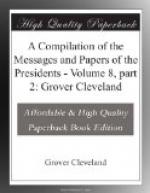Thirdly. The enactment of measures to favor the construction and maintenance of a steam carrying marine under the flag of the United States.
Fourthly. The establishment of an uniform currency basis for the countries of America, so that the coined products of our mines may circulate on equal terms throughout the whole system of commonwealths. This would require a monetary union of America, whereby the output of the bullion-producing countries and the circulation of those which yield neither gold nor silver could be adjusted in conformity with the population, wealth, and commercial needs of each. As many of the countries furnish no bullion to the common stock, the surplus production of our mines and mints might thus be utilized and a step taken toward the general remonetization of silver.
To the accomplishment of these ends, so far as they can be attained by separate treaties, the negotiations already concluded and now in progress have been directed; and the favor which this enlarged policy has thus far received warrants the belief that its operations will ere long embrace all, or nearly all, the countries of this hemisphere.
It is by no means desirable, however, that the policy under consideration should be applied to these countries alone. The healthful enlargement of our trade with Europe, Asia, and Africa should be sought by reducing tariff burdens on such of their wares as neither we nor the other American States are fitted to produce, and thus enabling ourselves to obtain in return a better market for our supplies of food, of raw materials, and of the manufactures in which we excel.
It seems to me that many of the embarrassing elements in the great national conflict between protection and free trade may thus be turned to good account; that the revenue may be reduced so as no longer to overtax the people; that protective duties may be retained without becoming burdensome; that our shipping interests may be judiciously encouraged, the currency fixed on firm bases, and, above all, such an unity of interests established among the States of the American system as will be of great and ever-increasing advantage to them all.
All treaties in the line of this policy which have been negotiated or are in process of negotiation contain a provision deemed to be requisite under the clause of the Constitution limiting to the House of Representatives the authority to originate bills for raising revenue.
On the 29th of February last[23] I transmitted to the Congress the first annual report of the Civil Service Commission, together with communications from the heads of the several Executive Departments of the Government respecting the practical workings of the law under which the Commission had been acting. The good results therein foreshadowed have been more than realized.
The system has fully answered the expectations of its friends in securing competent and faithful public servants and in protecting the appointing officers of the Government from the pressure of personal importunity and from the labor of examining the claims and pretensions of rival candidates for public employment.




